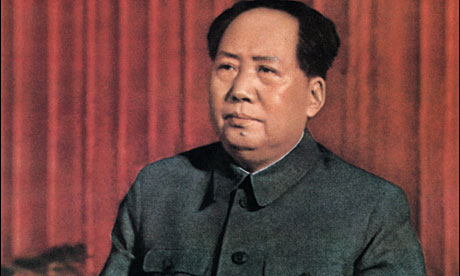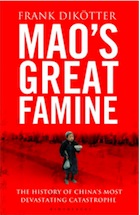The proof of this staggering ignorance is that I have (thankfully) never seen an American with clothing that extolled the virtues of fascism, but I have seen plenty of college students with shirts emblazoned Che's or even Mao's imagine. The problem with this is this is that unlike with Nazism, the fall of communism has prompted remarkably little self reflection and intellectual exploration among (so called) educated westerners. And interestingly, among the comments left by reader's of the Guardian were ones that were clearly apologetic of Marxism.
The lessons of Nazism are quite obvious: state sponsored racism inevitably leads to death and suffering. But, few reflect on the lessons of communism: state control of economic and social life is extremely hazardous, even when leaders are "wise" and "well meaning." At its best, central control of economic life leads to stagnation, scarcity and rancor, at its worst, it leads to the death and famine that Frank Dikötter so adeptly described.
Samuel Johnson prize won by 'hugely important' study of Mao
Mao's Great Famine by Frank Dikötter takes award for 'stunningly original' history of tyrannical regime

A retouched picture of Chairman Mao addressing Beijing's State Council in 1957. Photograph: AFP/Getty Images
Frank Dikötter's "stunningly original and hugely important" account of how Mao's Great Leap Forward led to the deaths of 45 million people has won him the Samuel Johnson prize for non-fiction.
Dikötter, a Dutch academic, accessed previously hidden archives to shine a light on China between 1958 and 1962, when millions of Chinese – he puts the figure at 45 million – were worked, starved or beaten to death as Mao attempted to overtake the west in less than 15 years. Ben Macintyre, historian, journalist and chair of the Samuel Johnson prize judges, called Mao's Great Famine the book of the year.
"This is not just an important book now, but it will become in some ways more important, as China becomes more powerful in the world and a greater part of global consciousness. To understand why China is the way it is, you almost have to read this book. If you want to understand why it's a materialistic, non-ideological place, you need to realise that just a generation ago, this appalling, manmade catastrophe was visited on its people," said Macintyre. "One of the judges, [biographer] Brenda Maddox, simply said 'this book changed my life - I think differently about the 20th century than I did before. Why didn't I know about this?' We feel we know who the villains of the 20th century are – Stalin and Hitler. But here, fully 50 years after the event, is something we did not know about. It's a testament to the power of non-fiction, that it can rock you back on your heels."
Mao's Great Famine, which beat five other shortlisted titles to win the prize, is "a vision of a society in utter collapse", said Macintyre, and Dikötter "ties it completely to Mao himself". "Often the famine is dismissed in the west as circumstantial, but Dikötter blows that myth completely out of the water. Mao and his cronies knew what was going on and just didn't care," said the writer, pointing to Mao's remark that "it is better to let half of the people die so that the other half can eat their fill."
Dikötter narrowly beat Maya Jasanoff's Liberty's Exiles, a history of the journeys of the American loyalists left behind by the 18th-century British evacuation, to win the £20,000 prize. "It was hard; really really hard ... Passionate feelings came to a head. At one moment we thought we might have to split the prize," said Macintyre, praising the "bursts of pure lyricism" in Jasanoff's work. But in the end Dikötter triumphed, becoming the second writer giving an insight into the communist east to win the Samuel Johnson prize in two years after Barbara Demick took it in 2010 for her journalistic investigation Nothing to Envy: Real Lives in North Korea.
"I think Samuel Johnson would have been stunned by what comes under the general heading of non-fiction these days – we were comparing [Jonathan Steinberg's] Bismarck, this monumental account of a great statesman, with Matt Ridley's delightful, trouble-making, brilliant futuristic look at what is happening to us all, [The Rational Optimist]. That's the pleasure of this prize. But in the end we tried to say which is the book of the year? And this is it," said Macintyre.
"It could have been overwritten, but part of what makes it work so well is it is written with quiet fury. He doesn't overstate his case because he doesn't need to. Its very strength lies in its depth of scholarship, lightly worn."
Dikötter, chair professor of humanities at the University of Hong Kong and professor of the modern history of China on leave from the School of Oriental and African Studies in London, was announced as winner of the Samuel Johnson prize at a ceremony in London on Wednesday evening. The author of nine books about China, he lives in Hong Kong.

No comments:
Post a Comment